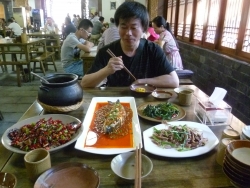Poetry is astonishingly so: Poems by Ya Shi
by Ya Shi
translated by Nick Admussen
These three short poems by the Sichuan poet Ya Shi, 哑石, center around hunger, pursuit, violence, and sustenance—whether those feelings are felt by a reader pursuing a poem, an epicure tasting exotic foods, or the witness of a colorful landscape bursting into view. As is so often the case in Ya Shi’s work, the goal is not freedom from desire in the old Daoist sense, nor is it the romantic satisfaction of the sublime, but some moment of reprieve and perspective derived from the struggle, the swan working hard below the waterline and perfectly placid above it.
These pieces are selected from a hundred-poem series called “Poetics,” 诗论, and make up part of a project Ya Shi has been engaged in for several years, in which he ties the practices of poetry to the practices of life and tests whether the responsibilities and joys of life are identical to, or differentiable from, the joys of poetry. Early works in this vein were long, luxurious prose poems, abundant in detail, structured parallels, and narrative; in these poems, we see the identity between our actions and our art minced into instants, into moments in which the unfolding of the beauty and pain of experience is identical to the risky moment when we open ourselves to a line of poetry.
Click anywhere below to read the poems in the original Chinese.
Poetics, #67
What’s written down, doubtlessly a grass snake’s grey line, is a trace.
Pursuers should have dog noses: pointed towards words’ ripples, their fish stink,
pointed towards fakery becoming spiritual history. To chase is to write it all again.
With some luck, between the lines of verse there will appear a swan,
she takes a breath, paddles water, causes layer on layer of overlapping ripples.
You worm to shore, skin topped in droplets, like little crystals that the evening light draws round.
Poetics, #97
Blue lobster meat. Red chili oil on a lump of green bamboo. White wood-ear mushrooms.
In Jia County, Henan, I experienced a whole cow’s head, steamed and minced.
—— what’re you doing, saying all this? In a lean spring, Paul Celan
threw himself into the Seine. Poetry is astonishingly so: what are you doing, saying all this!
Poetics, #99
Green embroiders spring trees, can’t stand the loneliness and crowding of the tumbling red,
the stones heat up, highway twisting to provoke the insects of the atmosphere.
Great chaos, broader than you can see. Tree branches launch kingfishers
but the ducts got there first, carved a micro-power structure into the cloud
—— and poetry, it’s still hiding love’s lake-colored handle,
rhythm knocking at the door of words, warning her, the dagger is whipping around blind.
诗论 67
写下的,无疑草蛇灰线,是踪迹。
追踪者最好有狗鼻子:针对词的荡漾、腥气,
针对伪装成精神的历史。追踪即重写。
若运气好,诗行间将出现一只天鹅,
她换气、划水,荡起层层叠加的涟漪。
你钻出来,身上水滴,像夕光拉圆的小晶体。
诗论 97
蓝龙虾肉。青笋块上的红油。白木耳。
河南郏县,我见识过一整个蒸得稀烂的牛头
——说这些干啥?瘦削的春天,策籣
投了塞纳河。诗赫然就如此:说这些,干什么!
诗论 99
绿绣春树,不忍落红的孤单、簇拥,
石头升温,高速路扭摆着撩拨大气的飞虫。
浑濛,比你见的阔大。树枝射翠鸟,
风喉,已抢先一步刻出云端微动力结构
——诗呢,仍秘藏著爱的湖色旋钮,
音律敲文字门窗,提醒她,尖刀正蒙眼疾走。
Published on November 17, 2017

